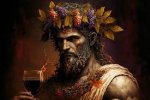Charms Of Dionysus


By skinner_jennifer
- 1037 reads
Maybe when it all began;
insatiable cravings trembled
on vintage grape, or perhaps
Dionysus spirit was sprinting
an intrepid caper rousing still
air,
awakening ardent rapturous
surrender; sustaining insatiable
intoxication – harvesting strange
visions, abandoning reality.
Fruit of his loins provides
fulfillment, embers glowing
warm with passion, his appeal
intense...revealing desires.
Dramatic thespian of spring
was he, enveloping young
blossoms; maidens of striking
beauty, besotted by his honeyed
lips on abandoned wild nights,
fresh bodies in ancient togas are
like fawns intermingling at his
charms – prancing with Dionysus
through forests; while even the
boyish charms are curiously
tempted – as the merry nymphs
watched on.
Pixabay free to use image.
According to Wikipedia
Dionysus was the god of
grape-harvest, wine making,
orchard and fruit vegetation,
fertility, festivity, theatre and
much more, freeing his followers
from self-conscious fear and care.
- Log in to post comments
Comments
Enjoyed that frolic from the
Enjoyed that frolic from the classics, Jenny. I should read up on this kind of thing really. Greek muses and the like. Nicely done, of course. Paul
- Log in to post comments
donysus was a busy man. Not
donysus was a busy man. Not that he was a man. you've capture him here.
- Log in to post comments
you have really caught the
you have really caught the wildness I associate with Dionysus. Your poem reminds me of how CS Lewis shows Bacchus his Narnia books
- Log in to post comments
C S Lewis did include
C S Lewis did include Dionysian Greek creatures in his Narnia books, such as Fauns, Centaurs, Dryads, Nymphs and Nyads. They seemed to make up quite a large proportion of the population of Narnia, and they were able to go into hiding during the White Witch and the Telmarines occupations. I presume these creatures were associated with Dionysus/Bacchus in Greek legends. I don't recall any particular mention of Dionysus/Bacchus himself?
Your poem is a good reminder of what Dionysus was all about, and the freedoms he represented.
- Log in to post comments
You capture in descriptive
You capture in descriptive verse, the free spirit of this god of wine and ecstasy. I enjoyed the fluid passages and poetic rhythm, like in this verse:
awakening ardent rapturous surrender; sustaining insatiable intoxication – harvesting strange visions, abandoning reality.
It is a beautiful poem; perfectly rendered.
- Log in to post comments


